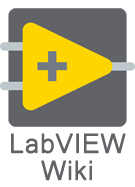Graphical Object-Oriented Programming: Difference between revisions
m GOOP moved to Portal:GOOP |
mNo edit summary |
||
| Line 1: | Line 1: | ||
This is the Portal for GOOP and LabVOOP. | This is the Portal for GOOP and LabVOOP. | ||
GOOP stands for "Graphical Object-Oriented Programming." | GOOP stands for "Graphical Object-Oriented Programming." | ||
LabVOOP stands for "LabVIEW Object-Oriented Programming." | LabVOOP stands for "LabVIEW Object-Oriented Programming." | ||
GOOP is a term used to refer to the various | GOOP is a term used to refer to the various OOP toolkits from V I Engineering, Endevo/NI, SciWare and OpenG. These toolkits were written in G. | ||
LabVOOP refers to the native LabVIEW classes that first appeared in LV8.2. | LabVOOP refers to the native LabVIEW classes that first appeared in LV8.2. | ||
The toolkits were not obsoleted by the native implementation. All of the toolkits use a reference model for passing objects on the block diagram, similar to File refnums or Queue refnums in LabVIEW. The native classes pass by value, similar to clusters and arrays. The two mechanisms are complementary, not exclusionary, and there may be times when both approaches are used in the same LV program. | The toolkits were not obsoleted by the native implementation. All of the toolkits use a reference model for passing objects on the block diagram, similar to File refnums or Queue refnums in LabVIEW. The native classes pass by value, similar to clusters and arrays. The two mechanisms are complementary, not exclusionary, and there may be times when both approaches are used in the same LV program. | ||
==Pages Here:== | ==Pages Here:== | ||
Revision as of 16:58, 14 May 2014
This is the Portal for GOOP and LabVOOP.
GOOP stands for "Graphical Object-Oriented Programming." LabVOOP stands for "LabVIEW Object-Oriented Programming."
GOOP is a term used to refer to the various OOP toolkits from V I Engineering, Endevo/NI, SciWare and OpenG. These toolkits were written in G.
LabVOOP refers to the native LabVIEW classes that first appeared in LV8.2.
The toolkits were not obsoleted by the native implementation. All of the toolkits use a reference model for passing objects on the block diagram, similar to File refnums or Queue refnums in LabVIEW. The native classes pass by value, similar to clusters and arrays. The two mechanisms are complementary, not exclusionary, and there may be times when both approaches are used in the same LV program.
